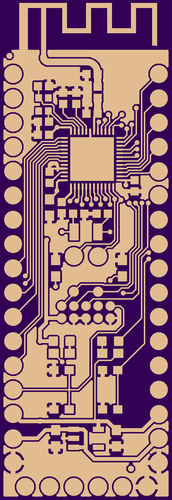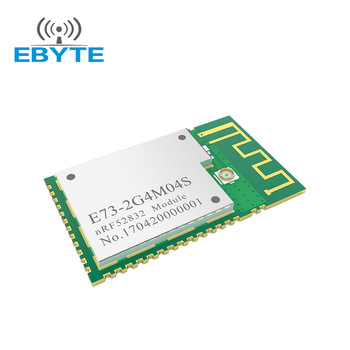nRF5 action!
-
how'd you program this blank nrf52832 chip with an SWD programmer like the ST link v2 what programming environment to use and so on?
I used the Arduino IDE with sandeepmistry arduino core installed and I managed to program a nrf51822 module with success. I used a cheap st-link programmer from AliExpress. I don't know about nrf52832 as I don't have one. But I don't see why it wouldn't work. You need 4 wires: Vdd(3.3V), GND, SWD and SWCLK.
From Arduino IDE you need to select st-link as programmer.
It uses openocd under the hood to do the work and it worked both on Windows and Linux. On Linux you might need to set udev rules for allowing regular user to use the st-link. -
I used the Arduino IDE with sandeepmistry arduino core installed and I managed to program a nrf51822 module with success. I used a cheap st-link programmer from AliExpress. I don't know about nrf52832 as I don't have one. But I don't see why it wouldn't work. You need 4 wires: Vdd(3.3V), GND, SWD and SWCLK.
From Arduino IDE you need to select st-link as programmer.
It uses openocd under the hood to do the work and it worked both on Windows and Linux. On Linux you might need to set udev rules for allowing regular user to use the st-link.@mtiutiu said in nRF5 Bluetooth action!:
I managed to program a nrf51822 module with success.
Did you power the nrf51822 through the st-link programmer, or did you power it independently?
-
I used the Arduino IDE with sandeepmistry arduino core installed and I managed to program a nrf51822 module with success. I used a cheap st-link programmer from AliExpress. I don't know about nrf52832 as I don't have one. But I don't see why it wouldn't work. You need 4 wires: Vdd(3.3V), GND, SWD and SWCLK.
From Arduino IDE you need to select st-link as programmer.
It uses openocd under the hood to do the work and it worked both on Windows and Linux. On Linux you might need to set udev rules for allowing regular user to use the st-link.@mtiutiu And when you want to program an independent chip with the ST link V2 do you just chose "generic nrf52"?
Also how is it possible to connect between through two NRF52s in slave master config?
Is it possible to take advantage of the NFC functionality with that programming environment? -
Good news! I received my second nRF52832 DK today, so now I can have a DK on both ends of a link. Bottom line: I ran some quick tests, and it has much better range than the Adafruit nRF52832 Feather.
Whew! What a relief. The Adafruit had very disappointing range. In contrast, and as expected, the two DK's have better range than regular nRF24L01+ radios.
-
Good news! I received my second nRF52832 DK today, so now I can have a DK on both ends of a link. Bottom line: I ran some quick tests, and it has much better range than the Adafruit nRF52832 Feather.
Whew! What a relief. The Adafruit had very disappointing range. In contrast, and as expected, the two DK's have better range than regular nRF24L01+ radios.
-
@NeverDie How did you manage to send and receive data between these two units? may you share the code with us?
@Mike_Lemo
I'm simply using the GatewaySerial and the LightSensor sketches from the mysensors developers release. Just make the following change in each sketch://#define MY_RADIO_NRF24 #define MY_RADIO_NRF5_ESB -
@mtiutiu said in nRF5 Bluetooth action!:
I managed to program a nrf51822 module with success.
Did you power the nrf51822 through the st-link programmer, or did you power it independently?
-
@mtiutiu And when you want to program an independent chip with the ST link V2 do you just chose "generic nrf52"?
Also how is it possible to connect between through two NRF52s in slave master config?
Is it possible to take advantage of the NFC functionality with that programming environment?I used generic and no soft device as Mysensors doesn't use soft devices. I don't know about master-slave, didn't used such a configuration.
You need to create another variant for other pin definitions as this is the way arduino framework works as far as I know.
Never used NFC so I can't give you hints on that, sorry.
-
Looks as though these guys came up with a fairly easy way to develop using actual bluetooth low energy: http://mklec.com/project-kits/kd-circuits/bluetooth-low-energy-board-anaren-A20737-module
Unfortunately, I don't believe it runs on the nRF5 though.
-
Looks as though the nRF52832 sparkfun board has more of a conventional trace antenna:

though isn't it somewhat odd that it appears to also be directly connected to the ground plane(?), or at least a copper pour. Is that normal? This was one of the images produced by sending their .BRD file to oshpark, so that I could get a look at the antenna.More good news! I was able to program a Sparkfun nrf52832 board using the DK, and its range is better than the Adafruit nRF52832 Feather and also better than an nRF24L01+.
So, my provisional conclusion is to avoid chip antennas, such as Adafruit is using, if better range is desired.
@NeverDie said in nRF5 Bluetooth action!:
Looks as though the nRF52832 sparkfun board has more of a conventional trace antenna:

though isn't it somewhat odd that it appears to also be directly connected to the ground plane(?), or at least a copper pour. Is that normal? This was one of the images produced by sending their .BRD file to oshpark, so that I could get a look at the antenna.Also, this now gives me a "known good" platform, namely the Sparkfun nRF52832 board, to order PCB's for and try to see if I can successfully solder on any of the bonus nRF52832 chips I received with my two DK's.
-
Apparently you can now run micropython on an nRF52832 board:
https://www.youtube.com/watch?v=50ImTDRREnUIt's still early days, but it sounds like fun. For one thing, since it's a dynamic language, OTA updates should be easy!
-
Apparently you can now run micropython on an nRF52832 board:
https://www.youtube.com/watch?v=50ImTDRREnUIt's still early days, but it sounds like fun. For one thing, since it's a dynamic language, OTA updates should be easy!
-
@NeverDie yes noticed their shop only 2 days ago and feeling frustrated now :D
For shipment delay I wouldn't be surprised if they shipped the same way with free option and it would just be a different way to state the delay on the 2 websites...@Nca78 said in nRF5 Bluetooth action!:
For shipment delay I wouldn't be surprised if they shipped the same way with free option and it would just be a different way to state the delay on the 2 websites...
You were right: I received both the ebay and the aliexpress packages today. Even for e-packet, that's pretty fast shipping! In fact, they arrived before any of the other items I ordered from other vendors. So, at least that part went well.
-
Does the E73-2G4M04S require anything extra in order to be programmed?

Today I tried programming it the same way that I have successfully with both the adafruit and the Sparkfun nRF52832 boards using the DK, but the DK keeps complaining that the E73-2G4M04S may not be connected. -
Does the E73-2G4M04S require anything extra in order to be programmed?

Today I tried programming it the same way that I have successfully with both the adafruit and the Sparkfun nRF52832 boards using the DK, but the DK keeps complaining that the E73-2G4M04S may not be connected. -
Yeah, here's what it says:
- The module embedded with ARM MCU. For program downloading, please use the J-LINK downloader, any other serial port or JTAG、ISP、ICP are
unavailable to download. - There’s two parts to download the program. Because the protocol stack
of NORDIC is not programmed yet, so users need to use the official nRFgo
studio of NORDIC to program the protocol stack first, then program the hex of application code. Or, to program the protocol stack of NORDIC first and
download via the IAR or KEIL.
Seems odd, but I'll give it a try.
- The module embedded with ARM MCU. For program downloading, please use the J-LINK downloader, any other serial port or JTAG、ISP、ICP are
-
It's not clear whether the DK can/should be used for this part of it, as it's unclear (at least to me) whether it will end up altering the target chip or the DK. I'm just not sure. So, to do at least this ambiguous part of it, I'll first check whether or not the nRFgo studio software will work with one of the other programmers I've collected (not the DK). That may take a while...
-
It's not clear whether the DK can/should be used for this part of it, as it's unclear (at least to me) whether it will end up altering the target chip or the DK. I'm just not sure. So, to do at least this ambiguous part of it, I'll first check whether or not the nRFgo studio software will work with one of the other programmers I've collected (not the DK). That may take a while...
-
@NeverDie if I remember well in the datasheet they say you have to put the softdevice on it first.
@Nca78 said in nRF5 Bluetooth action!:
@NeverDie if I remember well in the datasheet they say you have to put the softdevice on it first.
@NeverDie
you need to do this if you're using ble, it's the nordic stack running ble etc behind the scene.
For using nrf52 with MySensors, you don't need to do this. Also, MySensors & the softdevice can't run at the same time for the moment afaik.this module should work like others module, by following nrf52 datasheet.
looking at their datasheet, you maybe could add (i don't know if it's already onboard):- 100pf on DEC2
- 0.1uf on DEC1 (but they have no DEC1 1) it's already onboard, 2) there is a typo error on their datasheet ?? as DEC5 doesn't exist on nrf52)
- decoupling power
then it's just a matter of swd programming (3v,gnd,DIO,CLK)
You can take a look at nordic datasheet, or adafruit howtos are nice too.
-
@Nca78 said in nRF5 Bluetooth action!:
@NeverDie if I remember well in the datasheet they say you have to put the softdevice on it first.
@NeverDie
you need to do this if you're using ble, it's the nordic stack running ble etc behind the scene.
For using nrf52 with MySensors, you don't need to do this. Also, MySensors & the softdevice can't run at the same time for the moment afaik.this module should work like others module, by following nrf52 datasheet.
looking at their datasheet, you maybe could add (i don't know if it's already onboard):- 100pf on DEC2
- 0.1uf on DEC1 (but they have no DEC1 1) it's already onboard, 2) there is a typo error on their datasheet ?? as DEC5 doesn't exist on nrf52)
- decoupling power
then it's just a matter of swd programming (3v,gnd,DIO,CLK)
You can take a look at nordic datasheet, or adafruit howtos are nice too.
@scalz said in nRF5 Bluetooth action!:
- 0.1uf on DEC1 (but they have no DEC1 1) it's already onboard, 2) there is a typo error on their datasheet ?? as DEC5 doesn't exist on nrf52)
Great catch! Based in part on proximity to the DEC1 pins in the Ebyte datasheet, I'm guessing you've nailed it and that "DEC5" is actually DEC1.
Here's Nordic's pinout:
For other readers'convenience, here is a link (courtesy of NCA78) to Ebyte's datasheet:
https://forum.mysensors.org/assets/uploads/files/1499826952956-e73-2g4m04s_datasheet_en_v1.1.pdfBesides, as you point out, there is no actual DEC5 according to the Nordic pinout, so what else could "DEC5" be?
I've just now emailed the seller to ask this question, but for now I'll assume you've nailed it. Great work!

